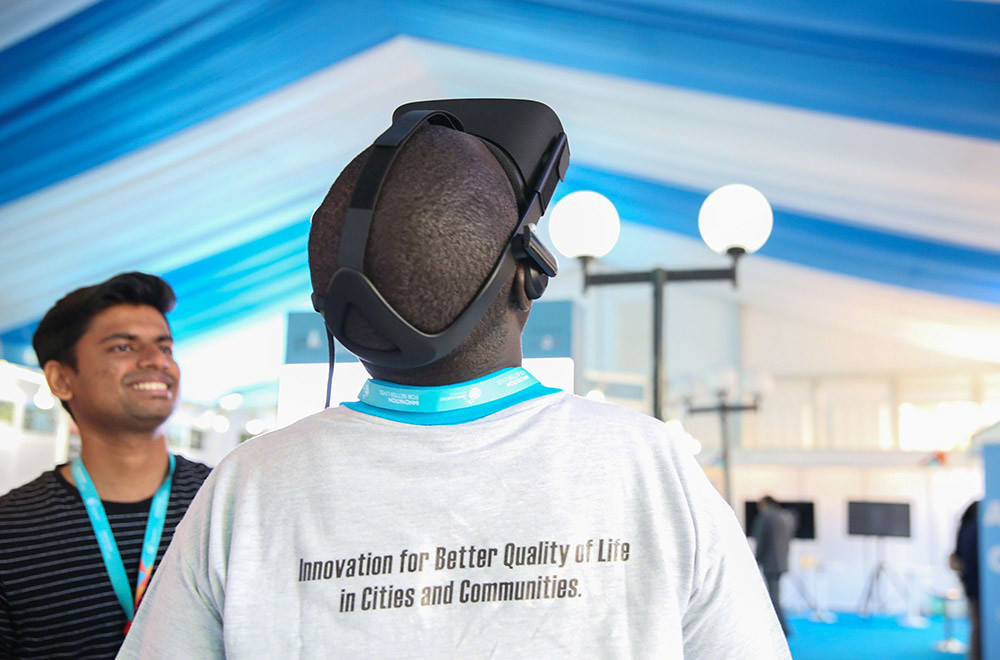UN-Habitat, the United Nations agency for sustainable cities, with support from the UN Office for Information and Communications Technology (UN-OICT), and in collaboration with HafenCity University Hamburg, are implementing the United Nations Innovation Technology Accelerator for Cities (UNITAC Hamburg) which will be located at the HafenCity University in Hamburg, Germany. UNITAC Hamburg will promote open and participatory governance of data and digital platforms, innovations related to mapping, spatial analysis and data visualization as well as promote the principles of people-centred smart cities.
“Digital technologies have the potential to serve people, improve public services and contribute to sustainable urbanization, but persistent digital divides remain. By establishing this Accelerator, UN-Habitat and our partners are contributing to building an inclusive digital society, developing digital capacity and fostering digital cooperation, as promoted by the UN Secretary General.”
- Maimunah Mohd. Sharif, Under-Secretary General and Executive Director of UN-Habitat
The Government of Germany is providing EUR 5,700,000 (approximately USD 6.6 million) over four years to support the efforts in enhancing the deployment of people-centred technologies and innovations for sustainable urban development, in line with the 2030 Agenda for Sustainable Development, the New Urban Agenda (NUA) and the United Nations Secretary General's Roadmap for Digital Cooperation.
UNITAC Hamburg, which will be officially launched on 16 March 2021, is composed of urban, technology and innovation experts, who will develop technologies to solve the world’s most pressing urban challenges and ensure that we speed up progress towards achieving the Sustainable Development Goals, particularly Goal 11 on sustainable cities and communities.
“With the establishment of the UNITAC Hamburg, we aim to support UN-Habitat in developing and deploying people-centred technologies and innovations for sustainable urban development. UN-OICT is committed to realizing the full potential of new and emerging technologies for tackling sustainable urbanization challenges. We are grateful for the commitment and assistance of the Federal Government of Germany in this effort.”
- Patrick Carey, Acting Assistant Secretary-General, UN-OICT

UNITAC Hamburg will work with applied research and development methodologies, based on in-depth analyses of urban challenges and urbanization trends. The work of UNITAC will be based around three themes: (1) Open, transparent and participatory governance of data and digital platforms (2) Mapping, spatial analysis and visualization, and (3) People-centred smart cities. Within these fields, specific emphasis will be placed on how to generate knowledge and use cases on smart city governance and the development of frontier technologies with particular attention on developing countries and cities with large informal populations.
The solutions developed by UNITAC Hamburg will be tested and piloted through UN-Habitat’s networks across the world with a focus on the Global South. UNITAC Hamburg will also work with the city of Hamburg to establish an urban technology acceleration testbed in Hamburg in which technologies, governance frameworks and approaches can be tested in a simulated urban environment before scaling them up internationally. Learning will be documented and published through high-quality guides and toolkits that can be used by policymakers to ensure that smart cities are inclusive, sustainable and people-centred.
“The demand for inclusion and for citizens to be heard and involved in planning processes and decision making will grow all over the world. Big data analysis and digitization can ease the way to a more inclusive development and transparency of decision-making procedures. Thanks to the commitment and openness of the city of Hamburg, we as a Technical University have been able to test new approaches and smart city technologies in an almost real-life urban lab. We are looking forward to expanding these activities even more in cooperation with UN-Habitat and feel honoured that other cities in the world will profit from our experiences.”
- Stephanie Egerland, Chancellor of HafenCity University
About the thematic focus areas
- Open, transparent and participatory governance of data and digital platforms
Recognizing that data and digital platforms are having a profound effect on urban life, there is a growing need to ensure that local governments and diverse urban stakeholders enhance the positive role of technology while safeguarding against its negative effects. Cities should have an active data governance strategy that includes making local government information open, transparent and accessible. This requires a new approach to data including functioning regulatory environments that build trust between citizens, governments, private companies and investors. Key issues include interoperability, procurement, public-private partnerships, digital inclusion and digital rights and ethical issues, for example related to privacy and security. UNITAC Hamburg will test approaches, develop technology and produce guidance on open and transparent digital governance for local and national governments.
- Mapping, spatial analysis, data analytics and visualization
New technologies such as artificial intelligence, remote sensing, big data, augmented and mixed reality or drones have the potential to play a key role for urban development, for example by improving urban planning, optimizing transport systems, collecting spatial data or visualizing important information for citizens. Approaches such as counter-mapping and ‘mapping the unmapped’, can help improve our understanding of informal settlements and improve service provision while ensuring that services reach the most marginalized communities. UNITAC Hamburg will test and apply a wide range of new software and hardware that can be used by urban managers and others for mapping, spatial analysis, data analytics and visualization of urban trends and data.

- People-centred smart cities
In recent years, the idea of the ‘smart city’ has emerged as an approach in which technologies are used to improve urban efficiency, quality of life and sustainability. The NUA calls for the adoption of a smart city approach that makes use of digitalization, clean energy and technologies. However, in too many smart city projects technology is applied uncritically, without considering the needs of cities, the people that live in them or the broader aims of sustainability and inclusion. At the same time, many local governments lack the capacity and strategic vision to procure appropriate technologies that meet their needs. The field is in danger of stagnation, perpetuating ongoing exclusion and needs an injection of fresh thinking. By taking an approach that is centred around the real needs of cities and their citizens, including marginalized communities, UNITAC Hamburg will develop a proof of concepts that are appropriate and contribute to inclusive and sustainable development.

UN-Habitat is the United Nations programme working towards a better urban future. Its mission is to promote socially and environmentally sustainable human settlements development and the achievement of adequate shelter for all. UN-Habitat works with partners to build inclusive, safe, resilient and sustainable cities and communities. It promotes urbanization as a positive transformative force for people and communities, reducing inequality, discrimination and poverty and provides technical assistance, policy advice, knowledge and capacity building to national and local governments in over 90 countries.
UN-OICT is the United Nations Office of Information and Communications Technology (ICT). The office provides technology solutions that harness the potential of information and communications technology to support the work of the United Nations. UN-OICT is responsible for defining a strategic direction for ICT to the United Nations Secretariat, and provides oversight of ICT policies, programmes, budgets and decision-making to ensure alignment with the Secretariat’s ICT strategic priorities.
HafenCity University Hamburg (HCU) is a public university in Hamburg, Germany, focusing on architecture, civil engineering and urban planning. Within this collaboration, the role of HCU is to conduct basic and applied research related to data and technology for cities, with an emphasis on the deployment, testing, and evaluation of urban innovation. HCU, especially through the City Science Lab, a cooperation with MIT Media Lab, will bring in its expertise and experience in citizen engagement, computational science/simulation and data visualization, as well as its local innovation ecosystem.
For more information, please contact us at unitac@un.org.